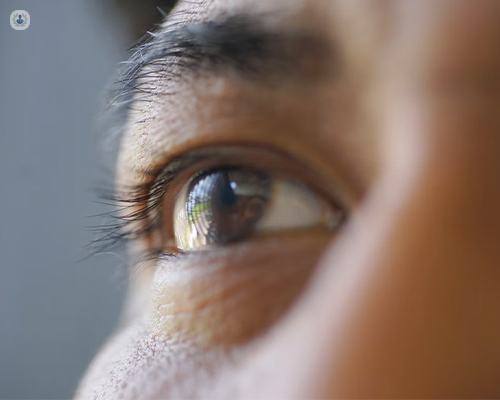Cataracts: what we need to know
Written in association with:Cataracts are a common eye condition, particularly among older adults, that cause clouding of the eye's natural lens, leading to impaired vision. By understanding the causes, symptoms, and treatment options for cataracts, individuals can take proactive steps to maintain their eye health. On hand to provide us with helpful information regarding cataracts is distinguished consultant ophthalmologist, Mr Thomas Ressiniotis.

Causes of cataracts
Cataracts develop when proteins in the eye's lens clump together, creating cloudy areas that interfere with vision. This process can be influenced by several factors. Ageing is the most significant risk factor, as changes in the lens proteins naturally occur over time.
Other factors include prolonged exposure to ultraviolet radiation, diabetes, hypertension, smoking, and excessive alcohol consumption. Certain medications, such as corticosteroids, and a history of eye injuries or surgeries can also increase the risk of developing cataracts. Additionally, genetics can play a role, as some individuals may inherit a predisposition to the condition.
Symptoms of cataracts
The symptoms of cataracts can vary depending on the severity and type of cataract. Common symptoms include blurred or cloudy vision, increased difficulty seeing at night, sensitivity to light and glare, and the appearance of halos around lights. Colors may appear faded or yellowed, and frequent changes in eyeglass or contact lens prescriptions may be necessary.
Double vision in a single eye is another possible symptom. These symptoms can gradually worsen over time, affecting daily activities such as reading, driving, and recognising faces.
Treatment options
The primary treatment for cataracts is surgical removal of the cloudy lens, followed by the implantation of an artificial lens, known as an intraocular lens (IOL). Cataract surgery is a highly effective and commonly performed procedure, with a high success rate and minimal complications. It is typically recommended when cataracts significantly interfere with daily activities.
In the early stages, when symptoms are mild, non-surgical approaches such as using stronger lighting, magnifying lenses, and updated eyewear prescriptions can help manage vision problems. Regular eye examinations are crucial for monitoring the progression of cataracts and determining the appropriate time for surgery.
Prevention and management
While cataracts cannot be entirely prevented, certain lifestyle changes can reduce the risk or delay their onset. Wearing sunglasses with UV protection, maintaining a healthy diet rich in antioxidants, avoiding smoking, and managing chronic health conditions like diabetes and hypertension are essential preventive measures. Regular eye check-ups are vital for early detection and management of cataracts and other eye conditions.


